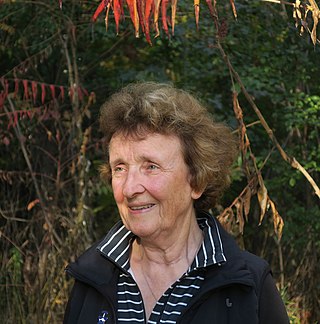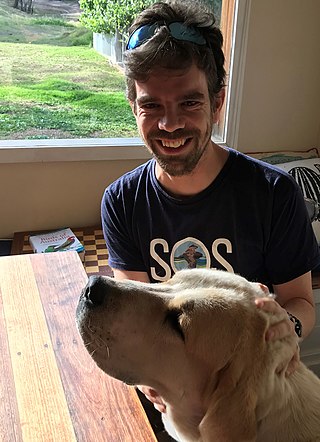
Thomas Eugene Lovejoy III was an American ecologist who was President of the Amazon Biodiversity Center, a Senior Fellow at the United Nations Foundation and a university professor in the Environmental Science and Policy department at George Mason University. Lovejoy was the World Bank's chief biodiversity advisor and the lead specialist for environment for Latin America and the Caribbean as well as senior advisor to the president of the United Nations Foundation. In 2008, he also was the first Biodiversity Chair of the H. John Heinz III Center for Science, Economics and the Environment to 2013. Previously he served as president of the Heinz Center since May 2002. Lovejoy introduced the term biological diversity to the scientific community in 1980. He was a past chair of the Scientific Technical Advisory Panel (STAP) for the Global Environment Facility (GEF), the multibillion-dollar funding mechanism for developing countries in support of their obligations under international environmental conventions.

The American Ornithological Society (AOS) is an ornithological organization based in the United States. The society was formed in October 2016 by the merger of the American Ornithologists' Union (AOU) and the Cooper Ornithological Society. Its members are primarily professional ornithologists, although membership is open to anyone with an interest in birds. The society publishes the two scholarly journals, Ornithology and Ornithological Applications as well as the AOS Checklist of North American Birds. The American Ornithological Society claims the authority to establish standardized English bird names throughout North and South Americas.

The Ecological Society of America (ESA) is a professional organization of ecological scientists. Based in the United States and founded in 1915, ESA publications include peer-reviewed journals, newsletters, fact sheets, and teaching resources. It holds an annual meeting at different locations in the USA and Canada. In addition to its publications and annual meeting, ESA is engaged in public policy, science, education, and diversity issues.
Ian Grote Stirling was a research scientist with Environment and Climate Change Canada and an adjunct professor in the University of Alberta Department of Biological Sciences. His research has focused mostly on Arctic and Antarctic zoology and ecology, and he was one of the world's top authorities on polar bears.
J. Michael Scott is an American scientist, professor, environmentalist and author.

Aldo Starker Leopold was an American author, forester, zoologist and conservationist. Leopold served as a professor at the University of California, Berkeley, for thirty years within the Zoology, Conservation, and Forestry departments. Throughout his life, Leopold was a public face for science. He was active in numerous wildlife and conservation groups and made significant research contributions in ornithology, mammalogy, and wildlife ecology. Leopold is notable for his ecosystem management paper, the Leopold Report, and his considerable presence in some of the most controversial wildlife issues, including national park wildlife policy, predator control, wildlife refuge, and fire policy.
The Cooper Ornithological Society (COS), formerly the Cooper Ornithological Club, was an American ornithological society. It was founded in 1893 in California and operated until 2016. Its name commemorated James Graham Cooper, an early California biologist. It published the ornithological journal The Condor and the monograph series Studies in Avian Biology. It presented the annual Loye and Alden Miller Research Award, which is given for lifetime achievement in ornithological research and was a member of the Ornithological Council.

Robert Eric Ricklefs is an American ornithologist and ecologist. He was the Curators' Professor of Biology at the University of Missouri, St. Louis from 1996 until August 2019.
The Wilson Ornithological Society (WOS) is an ornithological organization that was formally established in 1886 as the Wilson Ornithological Chapter of the Agassiz Association. It is based at the Museum of Zoology, University of Michigan, Ann Arbor, United States. It was named after Alexander Wilson, a prominent early American ornithologist. The name of the group later evolved through being generally known as the Wilson Ornithological Club until it became the WOS in 1955. It publishes the Wilson Journal of Ornithology. It is a member of the Ornithological Council.
David Cameron Duffy is an American professor of botany and zoology at the University of Hawaiʻi, former Director of the Hawaiian Pacific Island Cooperative Ecosystem Studies Unit. and currently holds the Gerritt Parmele Wilder Chair in the School of Life Sciences at the University of Hawaiʻi Manoa.
The Waterbird Society, formerly known as the Colonial Waterbirds Society, is a United States based ornithological society, focusing on the behavior, ecology, and conservation of waterbirds. It was founded in 1976 as the Colonial Waterbird Group, becoming the Colonial Waterbird Society in 1986 and acquiring its current name in 1999 to reflect an expanding interest in all waterbirds. A poster showing the time line of early developments can be downloaded from the Society's website. The Society operates mostly on annual membership dues.

BirdLife Australia is a not-for-profit organisation advocating for native birds and the conservation of their habitats across Australia.
John Patrick Croxall is a British biologist, and was Head of Conservation Biology at the British Antarctic Survey. He is Chair of Global Seabird Programme, of BirdLife International.

Kathy Martin is a Canadian ornithologist and an expert on arctic and alpine grouse and ptarmigan, and on tree cavity-nesting vertebrates. She is a professor in the Faculty of Forestry at the University of British Columbia, and was a senior research scientist with Environment and Climate Change Canada. From 2018 to 2020 she was president of the American Ornithological Society. Martin retired from the Canadian Federal Government in December 2020, and remains an emeritus scientist.
Lisa A. Levin is a Distinguished Professor of biological oceanography and marine ecology at the Scripps Institution of Oceanography. She holds the Elizabeth Hamman and Morgan Dene Oliver Chair in Marine Biodiversity and Conservation Science. She studies coastal and deep-sea ecosystems and is a Fellow of the American Association for the Advancement of Science.
Sarah Wanless is an animal ecologist in the UK and is an expert on seabirds; she is a Fellow of the Royal Society of Edinburgh and is Honorary Professor at the Universities of Glasgow and Aberdeen.

Alexander L. Bond is a Canadian conservation biologist, ecologist, and curator. He holds the position of Principal Curator and Curator in Charge of Birds at the Natural History Museum at Tring. Bond is actively involved with the marine plastics pollution research group Adrift Lab. Additionally, he serves as the Ornithologist in Residence at St Nicholas Church, Leicester, a church known for its LGBTQ+-inclusive stance.

Jennifer F. Provencher is a Canadian conservation biologist. She is an early-career researcher and a spokesperson for the awareness of plastic contaminants in marine wildlife, pollution and climate change. Many of her work focus on the impact of human activities on the health of Arctic seabirds and marine ecosystems.
Julia Parrish is an ecologist and conservation biologist at the University of Washington known for her research on seabirds and for her leadership in citizen science. She is an elected fellow of the American Association for the Advancement of Science.

Lindsay Young is an avian conservation biologist who has published over 110 journal articles and technical reports on Pacific Seabirds. She is currently Senior Scientist and Executive Director of the Pacific Rim Conservation. This nonprofit, research-based organization works to restore native seabird populations and ecosystems. She is also the current chair of the World Seabird Union. Young has also served as treasurer for the Pacific Seabird Group, as chair for the North Pacific Albatross Working Group, and as correspondent for the Agreement on the Conservation of Albatrosses and Petrels.









